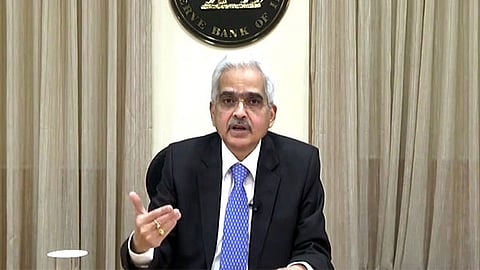

MUMBAI: The Reserve Bank Governor Shaktikanta Das has called for reforming the international financial architecture to ensure equitable voice and representation for emerging economies, and also overhauling the debt resolution architecture for vulnerable countries.
The governor also said pushing inflation out of the consumer price index basket will make inflation targeting meaningless, pushing back on the calls to remove food items from the CPI basket, which a section of economists believe will make inflation targeting more effective.
Food items constitute as much as 46.9 per cent of the CPI basket. While CPI spiked to 5.65 per cent in September from 3.56 per cent from August, food prices as a whole rose 9.24 per cent in the months with vegetable costs alone surging 36 per cent.
Rejecting the call from the chief economic adviser to the government to strip volatile food prices from inflation targets, saying such a move would make no sense to normal consumers, Das said, eliminating food, which accounts for nearly half the consumer inflation basket, would amount to “not having a target at all,” Das told the annual meeting of the World Bank and IMF in Washington on Friday, where leading finance ministers and central bank governors meet, under the aegis of the Macro Week 2024 organised by the Peterson Institute for International Economics.
“The first and foremost priority should be accorded to reforming the international financial architecture by prioritising inclusive global governance frameworks that better reflect the realities of today’s global economy,” Das said.
The governor also said there is a pressing need to improve global financial regulation to manage systemic risks posed by private capital and non-bank financial intermediaries.
“The current system, while foundational, needs to reform itself to ensure equitable voice and representation for the emerging economies. Enhanced access to resources and a stronger role in the governance of multilateral institutions such as the International Monetary Fund (IMF) and the World Bank will not only enhance their legitimacy but also foster more serious global cooperation in addressing macro-financial challenges,” Das said.
While the G20’s debt service suspension initiative and the common framework for debt treatments were commendable measures, the scale of the problem is much larger, the governor said, adding that the present debt restructuring processes are still ad hoc, slow, and, on several occasions, not sufficiently transparent, resulting in protracted crises, causing unnecessary economic sufferings for the debtor countries.
“We need an overhaul of the debt resolution architecture and its refashioning into one that involves both public and private creditors, ensures timely debt restructuring, and links debt relief with sustainable development objectives. Without such reforms, the vulnerable countries will continue to face unsustainable debt burdens which will have repercussions for global financial stability,” Das underlined.
Flagging concerns about the rise of shadow banking and fintechs, the governor emphasised the need to recognise the fragility and fault lines of the global monetary and financial system, both institutions and markets.
“Recent years have highlighted the risks posed by financial instability, in both advanced and emerging markets. There indeed is a pressing need to improve global financial regulation to manage systemic risks posed by private capital and non-bank financial intermediaries, which now hold significant portions of global assets.
“The rise of shadow banking and fintech, and the growing footprint of decentralised finance, requires more robust regulatory oversight to prevent contagion effects and ensure financial stability as a global public good,” Das said.
The governor further noted that as the global economy becomes more digitalized, countries that lack the infrastructure, skills, and regulatory frameworks for digital inclusion risk falling further behind.
The G20 and the international monetary and financial institutions should work towards nurturing an ecosystem that promotes investment in digital public infrastructure, and widespread adoption of digital technologies while ensuring cybersecurity and privacy safeguards, he said.
Das also observed that geopolitical tensions are increasingly affecting economic policies, leading to sanctions, weaponisation of finance, trade restrictions and supply chain disruptions. “This is causing economic fragmentation, as countries aim for strategic independence in key areas like energy, technology and strategic materials like semiconductors and critical minerals”.
Opining that G20 must play a key role in preventing further economic fracturing by promoting open and rules-based trade systems, the governor said while recognising the need for countries to secure their supply chains in tactically important sectors, the G20 should foster cooperation in areas such as technology transfer, investment in global public goods, and green transition.